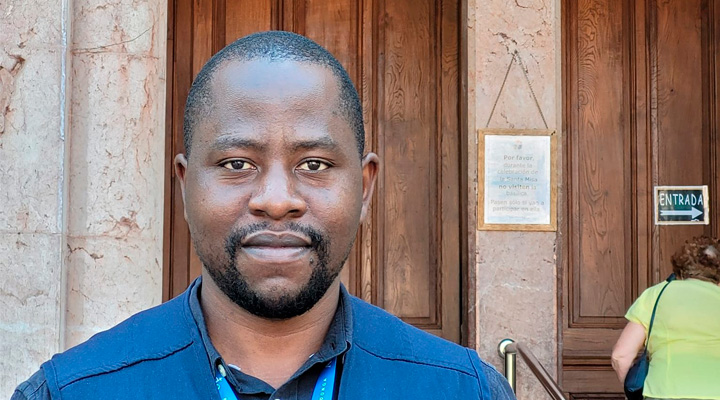
Simon John Muhangwa is a Tanzanian seminarian who resides at the Bidasoa International Seminary in Pamplona. He belongs to the diocese of Mwanza, in the northeast of the country, on the shores of Lake Victoria. After graduating as a civil engineer and working for two years, he left his profession to become a priest. Simon tells us about his vocation.
"I was born on January 20, 1992 in Magu district, in the Mwanza region. I come from a very Catholic family and I am the second of five children: three boys and two girls. I studied primary and secondary school in the Mwanza region. In 2010, I was selected to join advanced secondary education at Kibiti School in Pwani region, and in 2012 I finished. I enrolled at Mbeya University of Science and Technology, where I studied a Bachelor of Civil Engineering and graduated in 2016. Two years later, I started working at Tanzania Urban and Rural Roads Agency (TARURA) in Dodoma town as a civil engineer. Because of my skills, I was appointed as a Professional Engineer."
"I don't remember exactly when I first considered becoming a priest, but it's true that from a young age I was attracted to the priesthood and admired religious people. Praying with my family was something that also moved me. Little by little, a voice inside me told me that I could be a priest someday.
When I was at the advanced school in Kibiti, I belonged to a group of young catholic students and I was selected to be the leader of the group. At that time, some of my friends were telling me that I was going to be a priest. Over time, that sense of attraction and enthusiasm for the priesthood begins to take its toll on me."
"Because of all that, I began to look for information about the priesthood and I asked for spiritual help from the pastor of my school, Father Christian Lupindu, whom I thank for all his advice. Christian Lupindu, whom I thank for all his advice. And after finishing my secondary studies, which I did in a boarding school a thousand kilometers away from my city, I returned home. I continued my discernment and shared this concern with my parish priests, Father Bartazar Kesi and Father Andrea Beno, both missionaries. However, when I told my parents about my concerns, they advised me to study at the university first".
"There at the university I joined a Christian youth community where I was also made a group leader. I was also elected as the zonal president of my university. My restlessness for the priesthood was growing and I met with a university chaplain, Father Fidelis Damana, also a missionary. His spiritual help was instrumental in my discernment.
After finishing my university studies, I returned to my parish and was invited to continue reflecting on my vocation to the priesthood. After two years of professional work as a civil engineer, in 2020, I was admitted as a seminarian in the diocese of Mwanza. Subsequently, my bishop sent me to study to the Bidasoa Seminar in Pamplona".
"In my country, the main and most necessary are catechesis for youth. It is one of the tasks I am most excited about doing when I return to my country. I hope to put at the service of the Church all the experience I gained as a leader of the Catholic youth groups I served as a student both in high school and university.
In addition to being well trained to be able to answer questions about the Catholic faith, I would also like to help with my engineering knowledge and be able to bring the faith into the modern world, whether in technology or environmental sectors."
Tanzania has an area of 945,087 square kilometers and is bordered by the Indian Ocean, Burundi, Kenya, Malawi, Mozambique, Uganda, Rwanda and Zambia. The country has numerous local languages, predominantly Swahili and English. Its capital is Dodoma. The fertility rate is 4.59 children per woman. Life expectancy is 59.3 years. The urban population is 36.45 %. The ethnic composition is 95 % Bantu from 130 different tribes. The country is rich in gold and diamond mines. There are currently 63,341,000 inhabitants, out of which 19,192,000 of which 19,192,000 are Catholics, or 30.3 % of the population.according to statistics published by the Holy See.
"In my country the main and most necessary thing is catechesis for the youth. This is one of the tasks I am most looking forward to doing when I return to my country".
"When I arrived in Bidasoa I found a very friendly atmosphere. At first it was difficult because of the language and also getting used to the Spanish culture. But I have received a lot of help to learn Spanish and now I can communicate with my brothers. Now I am enjoying a lot with so many seminarians from different countries. It is wonderful. I am very happy to be here, and I thank God for giving me this precious opportunity to study at the Ecclesiastical University of Navarra and to meet with these good people and fellow Catholics."
"I would like to say a big thank you to our benefactors at CARF for the tremendous support they provide us in our training, especially the Tanzanian seminarians. God bless you.
Marta Santín
Journalist specializing in religious information.